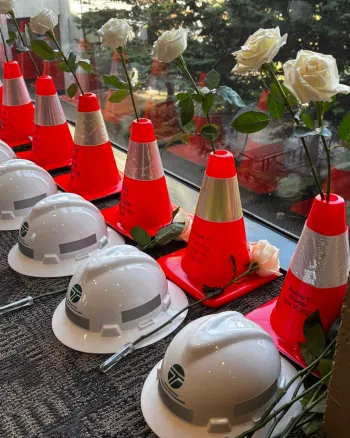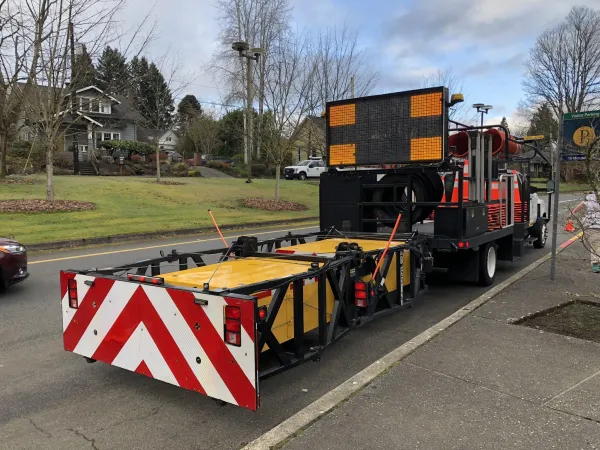Union Action Wins 10% Assignment Pay for WSDOT Workers

Mark Keire, WFSE Local 2259 President, won 10% assignment pay for WSDOT employees working on Truck Mounted Attenuators, or TMAs.
After a 30-plus year career as a union steelworker, Keire made the jump to state service.
“ I work with the sign crew for the Southwest region. We are within inches of the fog line and within inches of vehicles flying by us,” Keire said.
“It’s dangerous work. There's no way to sugarcoat that.”
Not a union member? Unions help us to ensure employee safety and give us a voice at the table. Join today!
Important Work, High Risks
Keire’s sign crew makes sure motorists have important safety and navigation information. Their work is highly skilled and involves high levels of risk.

Keire took a significant pay cut to come to public service, but he finds his work satisfying and impactful.
“When you're working for the Department of Transportation, there's a level of craftsmanship that is involved in everything that we do. I wanted to serve; I wanted to see my product in action,” he said.
This is Dangerous
Keire’s decades of union membership, leadership and activism came in handy when he realized WSDOT employees were not being given assignment pay for a particularly hazardous task: working on the back of the TMA.
Used in situations where workers are at risk of a high-speed collision, TMAs are mounted on the back of WSDOT trucks to absorb impact when accidents occur.

On one shift, Keire was assigned to work with traffic control, setting cones out to alert drivers.
“When you're setting cones, you're literally wearing a harness and you're tethered to a rail on the vehicle,” Keire said.
“If that vehicle is struck, you're gonna fly all over the back of that truck. I asked, ‘Do we get [assignment pay] for this? Because this is kind of dangerous.’”
Keire’s crew told him that the role was not compensated with assignment pay—only the driver would get the higher pay.
“That just didn't make sense to me,” Keire said.
Raising the Issue
Over the following weeks, Keire spoke to workers at DOT sheds across his region. Everyone concurred that only drivers, not the crew on the back of the truck, received assignment pay.
After presenting the issue at several policy committees, it was raised to the statewide union-management communication committee (UMCC).
UMCCs are regular discussions scheduled between management and elected WFSE members to solve issues at the ground level. They’re guaranteed in our union contracts and are just another example of the difference of working in a union shop.
After some investigation, management returned to let the committee members know that the crew was also owed the extra pay.
“ I just started telling everybody, ‘The crew gets assignment pay, the crew gets AP pay,’” Keire said. “Anytime we were driving by, we would pull into the shed. ‘Hey, just so you guys know, if you're setting cones, you're getting AP pay.’”
Using Our Power
Keire is a firm believer in the power of active and engaged union members. He encourages members in his local and coworkers who have not yet joined to consider the strength we have in numbers, and what we can accomplish with a little advocacy and strategy.
“The only reason we got the TMA pay is because I'm a delegate to the policy committee,“ Keire said. “If I hadn't gone and asked, nobody was gonna say anything about it, because the state knew they were ripping us off.”
We need to use our voices to solve problems and make positive change in our workplaces and beyond. That’s what unions are all about. Not a member yet? Join here.
